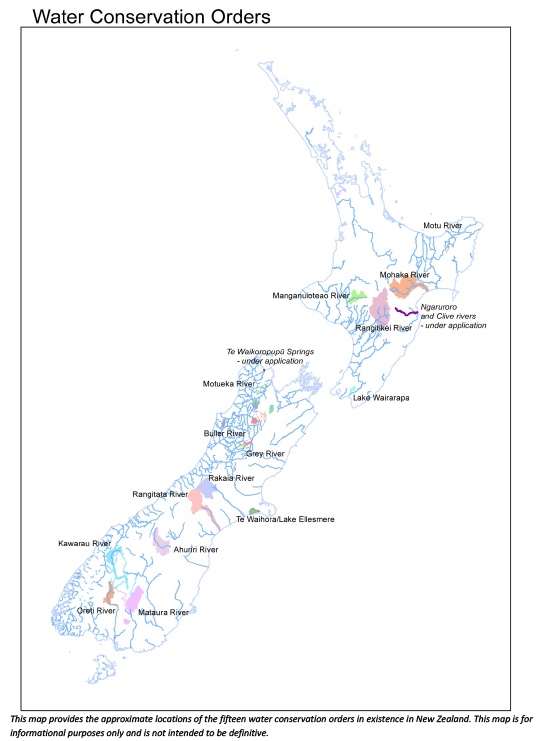Water Conservation Orders (WCO’s) are mechanisms under the Resource Management Act designed to recognise and protect outstanding values of particular bodies of water. Commonly associated with movements in the 1980’s to protect the country’s most wild and scenic rivers from hydroelectric dam initiatives, they are legal instruments that can be used to set rules that Councils must abide by.
A WCO is the highest level of protection that can be afforded to any water body, and are focused purely around preserving outstanding natural values for all freshwater fish, wildlife and outdoor recreation. There are a number of WCO’s around the country applying to different water bodies in different ways.
With such a pure focus a WCO can have significant influence on the content of Regional Policy Statements and Regional and District Plans, as well as resource consent processes. Criticised in some circles for being too narrowly focused and lacking the ability to weigh and balance competing interests, this is essentially their purpose as a tool to identify the water bodies or stretches of water bodies that warrant the highest level of protection without compromise.
The WCO for the Ngaruroro and Clive rivers lodged by the New Zealand Fish and Game Council, Ngāti Hori ki Kohupatiki, Whitewater New Zealand, Jet Boating New Zealand and the Royal Forest and Bird Protection Society of New Zealand, seeks the protection of the entire length of the Ngaruroro River and its tributaries, together with groundwater that is hydraulically connected to the lower Ngaruroro River. A total of 7km of the Clive River is also included.
The application states that the water bodies have certain outstanding values including:
- Significance in accordance with tikanga Maori;
- Cultural and spiritual purposes;
- Habitat for rainbow trout;
- Angling, amenity and recreation;
- Habitat for avifauna;
- Habitat for native fish;
- Boating amenity and recreation;
- Wild, scenic and natural characteristics; and
- Scientific and ecological values.
Protection of these values is sought through a number of conditions applying to different stretches of the water bodies, including minimum flows and allocation limits for existing and new water takes.
In principal, the WCO does not seek to change the existing 2,400l/s minimum flow at Fernhill as it applies to existing resource consents to take water, but does seek to introduce a new minimum flow of 4,200l/s for any new takes.
Potential implications of the various conditions are complex to understand though, and there is concern among some parties that many groundwater takes in the region will have restrictions placed upon them in a similar manner as direct river takes, and that this may really affect the water security and resilience of many operations.
Consideration of the WCO is very different territory to the type of processes we have become familiar with over the last few years. Essentially all the same parties are involved, but in this case the parties who are often the submitters are the proponents.
The manner in which the proposal is to be considered is also different. While collaborative policy development initiates such as TANK, plan change processes and resource consent application processes entertain the weighing of competing environmental, cultural, economic and social interests, WCO’s are much more focused around environmental outcomes.
There is certainly a place for this, but one can’t help being a little concerned about how far reaching potential outcomes maybe from both a geographic and regional productivity perspective.
If one was to strategically limit the potential of the region, for whatever bizarre reason, we would unreasonably limit access to water, set overly conservative instream water quality standards, force unsustainable change at an unreasonable rate, introduce poorly conceived land use controls, fuel the urban and rural divide and assume prescriptive regulation rather than partnerships will better achieve environmental performance.
Clearly no one who is passionate about our region would set out to achieve this, but in determining what we want, perhaps we should be very aware of what we don’t want.



